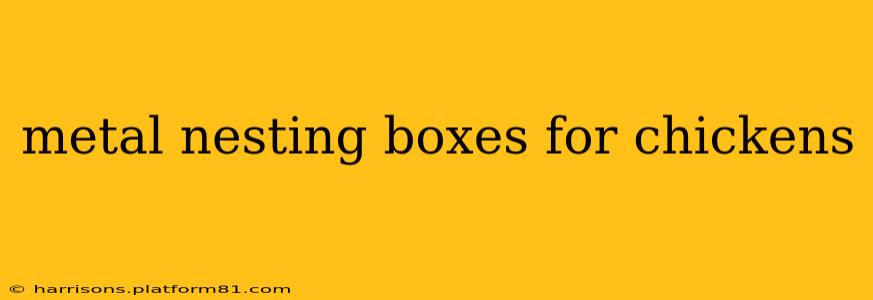Choosing the right nesting box is crucial for happy, healthy hens and consistent egg production. While wooden nesting boxes are traditional, metal nesting boxes offer a compelling alternative with unique advantages. This guide explores the benefits, drawbacks, and considerations when selecting metal nesting boxes for your chickens.
Why Choose Metal Nesting Boxes?
Metal nesting boxes, typically made from galvanized steel or aluminum, boast several benefits over their wooden counterparts:
-
Durability and Longevity: Metal is significantly more resistant to damage from pecking, scratching, and general wear and tear. Unlike wood, which can rot, warp, or be chewed, a well-constructed metal nesting box will last for years, even decades, with minimal maintenance. This translates to long-term cost savings.
-
Easy Cleaning and Sanitation: Metal surfaces are easy to clean and disinfect. This is crucial for preventing the spread of diseases and parasites. Simply wipe down the interior with a disinfectant solution, making it much simpler than cleaning out the crevices of a wooden box.
-
Pest Resistance: Metal nesting boxes are less susceptible to infestation by rodents, insects, and other pests that can damage the structure or contaminate eggs. This added protection contributes to cleaner and safer egg production.
-
Temperature Regulation (in some cases): Certain metal types and designs can offer better temperature regulation than wood, particularly in extreme climates. However, this depends on the specific metal used and the overall design of the nesting box. Always consider ventilation to prevent overheating.
-
Security: Metal construction can deter predators from accessing the eggs and potentially harming your hens. This added layer of security contributes to a safer nesting environment.
What are the Drawbacks of Metal Nesting Boxes?
While metal nesting boxes have many positives, there are a few potential drawbacks to consider:
-
Heat Absorption/Conduction: Metal can absorb and conduct heat, potentially making the nesting box uncomfortable for hens, especially in hot climates. Adequate ventilation is essential to mitigate this.
-
Cost: Metal nesting boxes might be initially more expensive than wooden options. However, their longevity often makes them a more cost-effective choice in the long run.
-
Potential for Cold: In very cold climates, the metal can become quite cold, potentially making the nesting box less appealing to hens. Adding insulation can help alleviate this issue.
-
Weight: Metal nesting boxes tend to be heavier than wooden ones, which can make installation and moving more challenging.
What Size Metal Nesting Box Should I Get?
The ideal size depends on the breed of your chickens. Larger breeds will need more space than smaller breeds. A good rule of thumb is to provide at least 12 inches x 12 inches of floor space per hen, although some hens prefer more personal space. The height should be sufficient for hens to comfortably sit and lay their eggs without feeling cramped. Always consider the number of hens you have and plan accordingly, providing enough nesting boxes to avoid competition and stress.
How Do I Clean a Metal Nesting Box?
Cleaning a metal nesting box is relatively straightforward. Remove any soiled nesting material (straw, shavings, etc.). Then, thoroughly wash the interior with warm, soapy water. Rinse well and disinfect with a poultry-safe disinfectant solution. Allow the nesting box to completely dry before replacing the nesting material. Regular cleaning, at least once a week, is recommended to maintain hygiene and prevent disease.
Are Metal Nesting Boxes Worth It?
Whether metal nesting boxes are "worth it" depends on your individual circumstances and priorities. If durability, easy cleaning, and pest resistance are high on your list, then metal is a strong contender. However, if budget is a significant constraint, or if you live in an extremely hot or cold climate, you might need to weigh the pros and cons more carefully and consider supplemental insulation or cooling options.
Ultimately, choosing the right nesting box is about creating a comfortable and safe environment for your hens, promoting healthy egg production, and simplifying your chicken-keeping routine. Metal nesting boxes can be a great solution for many chicken keepers, providing lasting value and ease of care.
